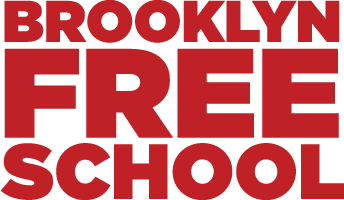Pre-K Program
In the preschool, we are led daily to new ideas and lessons by the unexpected question, the curiosity, and the energy of our youngest students. Their voices are heard and valued. Studying within a community where they are respected helps them build empathy as they learn about themselves, others, and the world. We directly engage issues of fairness and justice while facilitating the power and agency of self-directed learning.
“Brooklyn Free School really values young people’s thinking. What a difference that makes for my 4 year old! She knows her play is important, her voice should be heard, and that she can use her power to make things better.”
Schedule
Our Guiding Principles at Work in the Pre-K
Teaching and Learning
Cooperative learning.
Students teach and learn from each other; older students in the classroom help their younger peers draw, write, and build.
Child-led activities and classes.
Teachers solicit student interests and design classroom activities in response to student requests. Student teaching is encouraged whenever possible.
Play for play, and play as catalyst.
Imaginative play is one of the most important things children this age can do to learn about the world and relationships, and time to invent and play together is prioritized each day.
Reading, writing, math.
Foundational skills are taught through games and use of manipulatives. Counting out snack, writing letters to friends, or measuring fabric that will make an outfit for a stuffed bear; classroom materials and teacher prompting bring play and learning together.
Independent exploration.
In their classroom, students have access to material centers for imaginative work and play.
Equity
Diverse reading materials.
We read books that reflect our world, with characters of varied ethnicities, backgrounds, and perspectives.
Shared class resources.
Classroom materials are provided to all students from a common pool.
Race and gender studies.
We study the construction and lived experience of racial and gender identity in age appropriate ways; such as reading books, drawing, sharing stories, inviting guests to our class, and asking questions.
Democratic meetings.
Students take part in advisory democratic meetings to discuss issues important to them, and to decide how their advisory should be run. See "Democratic Meeting" for more detail.
Classroom agreements.
Students create shared agreements and guidelines for behavior and participation.
Conflict resolution.
Students are taught to use mediation and democratic meetings to resolve conflict.
Voting.
Our Pre-K students make their voices heard through direct voting in meetings and making classroom decisions.
Listening.
We make sure that every voice has a chance to be heard during meetings and conflict resolution.
Every trip for every student.
Trips are paid for from a shared fund, which is replenished by school-wide fundraising. Trips are only an option if the cost can be covered for every single student.
Play
Outside!
We get outdoors every day, multiple times a day, in most weather. Field trips are a regular part of our curriculum.
The natural world.
We find connections to nature even in this big city.
Free play.
Every day has time reserved for free play.
Community
Age mixing.
We take field trips with other advisories, play with older students every day at the park, invite students to come to our classroom to read and play with us, or simply hold an older student’s hand on the way to the playground.
All-school celebrations and events.
Throughout our school year, we join the rest of the school, and our school families, in holiday celebrations, work fairs, and potlucks.
Care for our classroom.
All students have a daily classroom cleanup job.
Family.
We invite parent volunteers to join us on field trips, for special projects, and for special events such as birthday celebrations.





